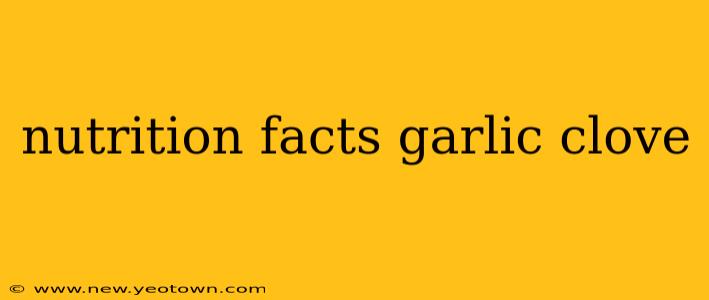Garlic, that pungent bulb often relegated to the condiment category, is far more than just a flavor enhancer. It's a nutritional powerhouse, brimming with vitamins, minerals, and potent compounds that have been linked to a plethora of health benefits. Let's peel back the layers and explore the nutritional facts of a single garlic clove, unveiling its hidden secrets.
A single, medium-sized garlic clove (approximately 1 gram) packs a surprisingly robust nutritional punch. While the exact values can vary based on factors like growing conditions and variety, here's a general overview:
- Calories: Negligible (around 4-5 calories)
- Carbohydrates: A small amount (roughly 1 gram), mainly in the form of simple sugars.
- Fiber: A trace amount, contributing to overall gut health.
- Protein: Minimal (less than 1 gram).
- Fat: Essentially none.
- Vitamins and Minerals: Garlic cloves are a good source of manganese, vitamin B6, vitamin C, and small amounts of other essential nutrients.
What are the main benefits of eating garlic?
Garlic's health benefits extend far beyond its nutritional profile. Many of its positive effects are attributed to its unique chemical composition, particularly its high concentration of allicin. Allicin, formed when garlic is crushed or chopped, is believed to be responsible for many of its medicinal properties. Studies suggest garlic may:
- Boost the immune system: Allicin's antimicrobial properties may help fight off infections.
- Lower blood pressure: Some research suggests garlic can help relax blood vessels, potentially lowering blood pressure.
- Improve cholesterol levels: Garlic might help reduce LDL ("bad") cholesterol levels.
- Possess antioxidant properties: Garlic contains compounds that can help neutralize free radicals, protecting cells from damage.
How many calories are in a clove of garlic?
As mentioned earlier, a single clove of garlic contains a negligible amount of calories—approximately 4-5 calories. This makes it a very low-calorie food that can be incorporated into your diet without significantly impacting your overall calorie intake. Its nutritional value far outweighs its minimal caloric contribution.
Is garlic good for weight loss?
While garlic itself doesn't directly contribute to significant weight loss, it can indirectly support weight management efforts. Its low-calorie nature, along with potential benefits in regulating blood sugar and cholesterol, can contribute to a healthier overall diet, which is crucial for sustainable weight loss. Remember, weight loss is best achieved through a balanced diet and regular exercise.
What are the side effects of eating garlic?
While garlic is generally safe for consumption, some individuals may experience mild side effects, especially when consuming it in large quantities. These can include:
- Bad breath: This is perhaps the most common side effect, often attributed to the sulfur compounds in garlic.
- Heartburn or indigestion: Garlic can sometimes cause digestive discomfort in some people.
- Allergic reactions: Although rare, allergic reactions to garlic are possible.
Is it better to eat raw garlic or cooked garlic?
Both raw and cooked garlic offer potential health benefits, but their effects may differ slightly. Raw garlic contains a higher concentration of allicin, the potent compound associated with many of garlic's health benefits. However, cooking garlic can make it more palatable for some people and may increase the bioavailability of certain other beneficial compounds. The best approach is to incorporate both raw and cooked garlic into your diet for a broader range of benefits.
In conclusion, the humble garlic clove is a nutritional gem, offering a wealth of potential health benefits. Incorporating it regularly into your diet, whether raw or cooked, can contribute to a healthier lifestyle. Remember, while garlic is a powerful ally for good health, it's always advisable to consult your doctor or a registered dietitian before making significant changes to your diet, especially if you have pre-existing health conditions.

